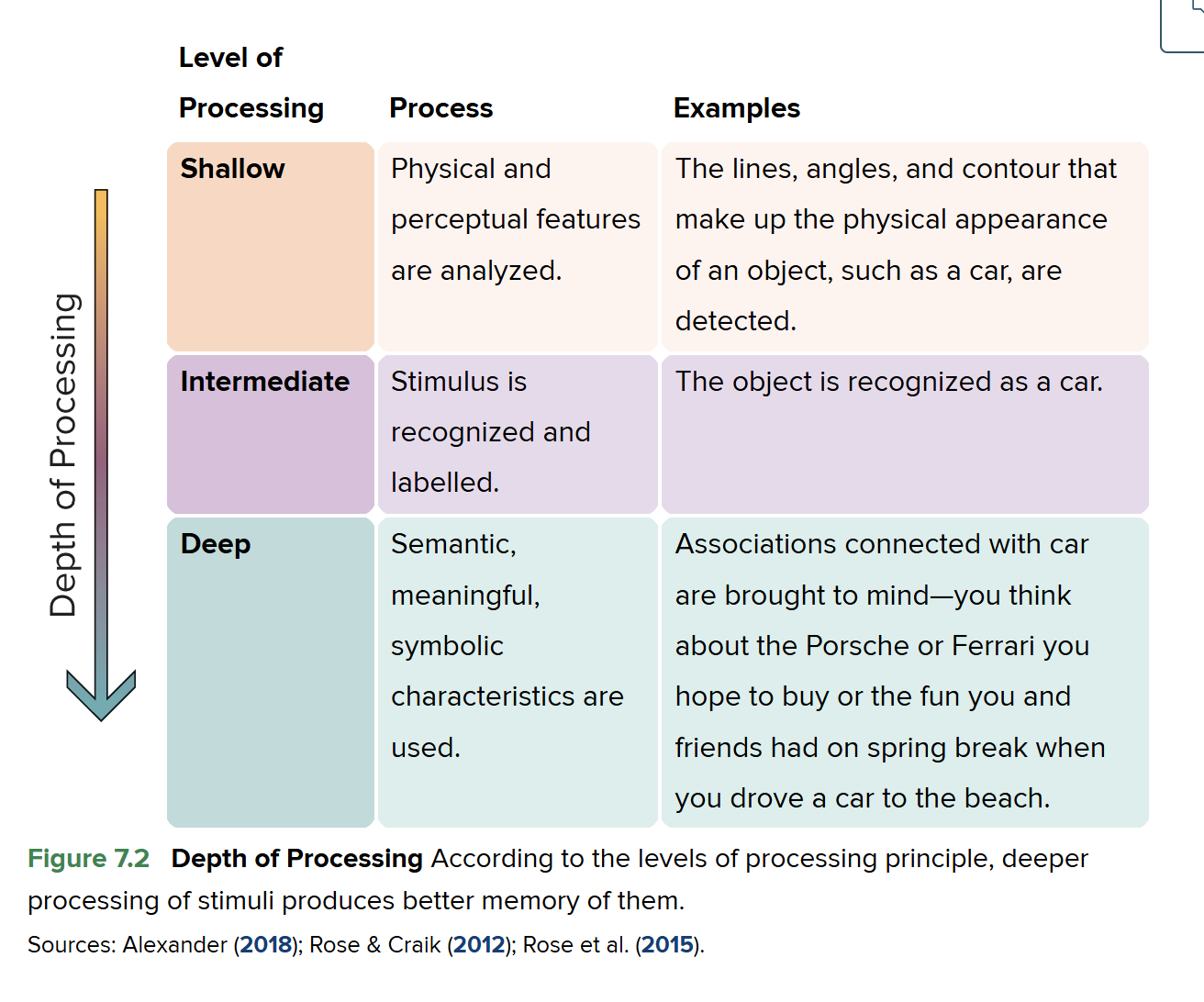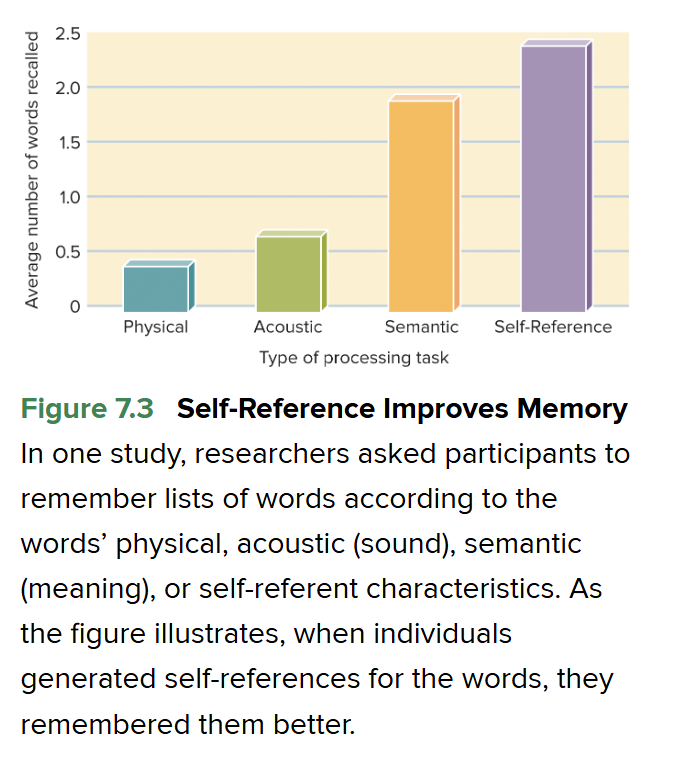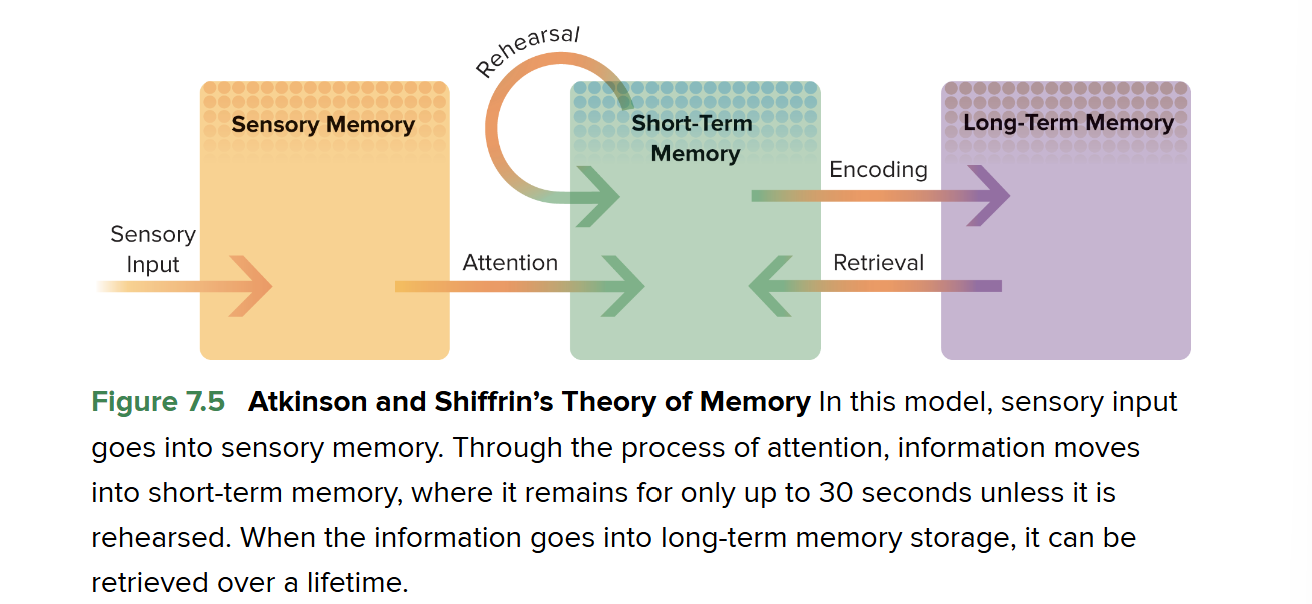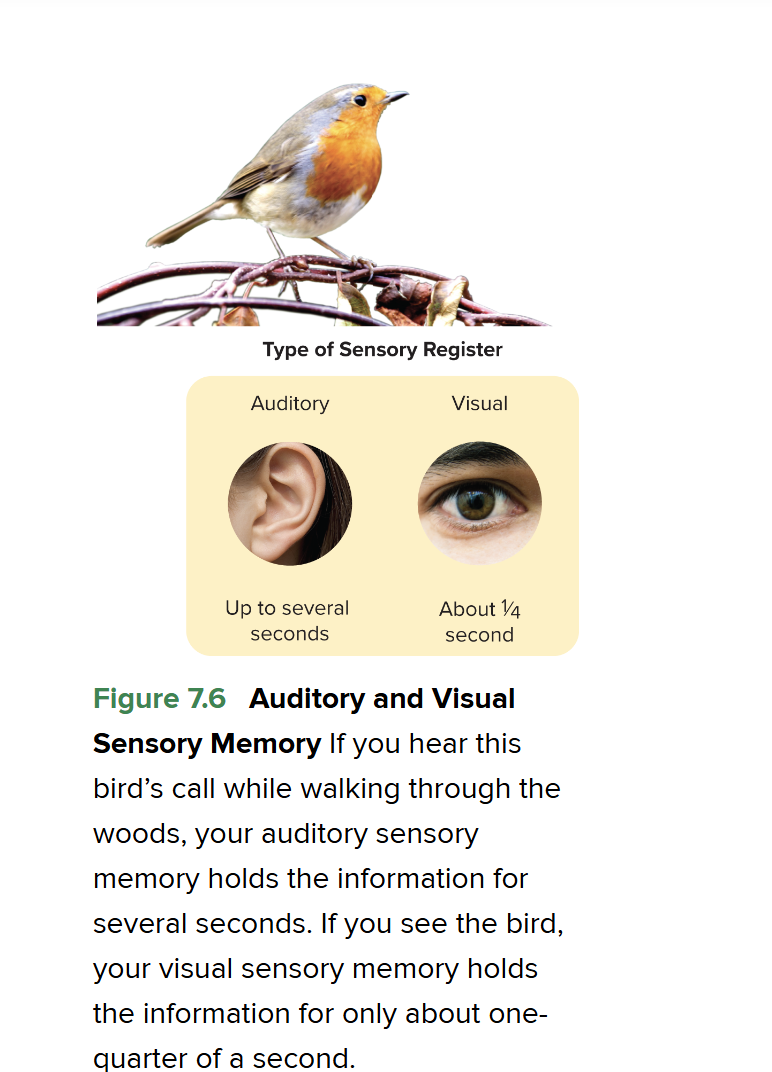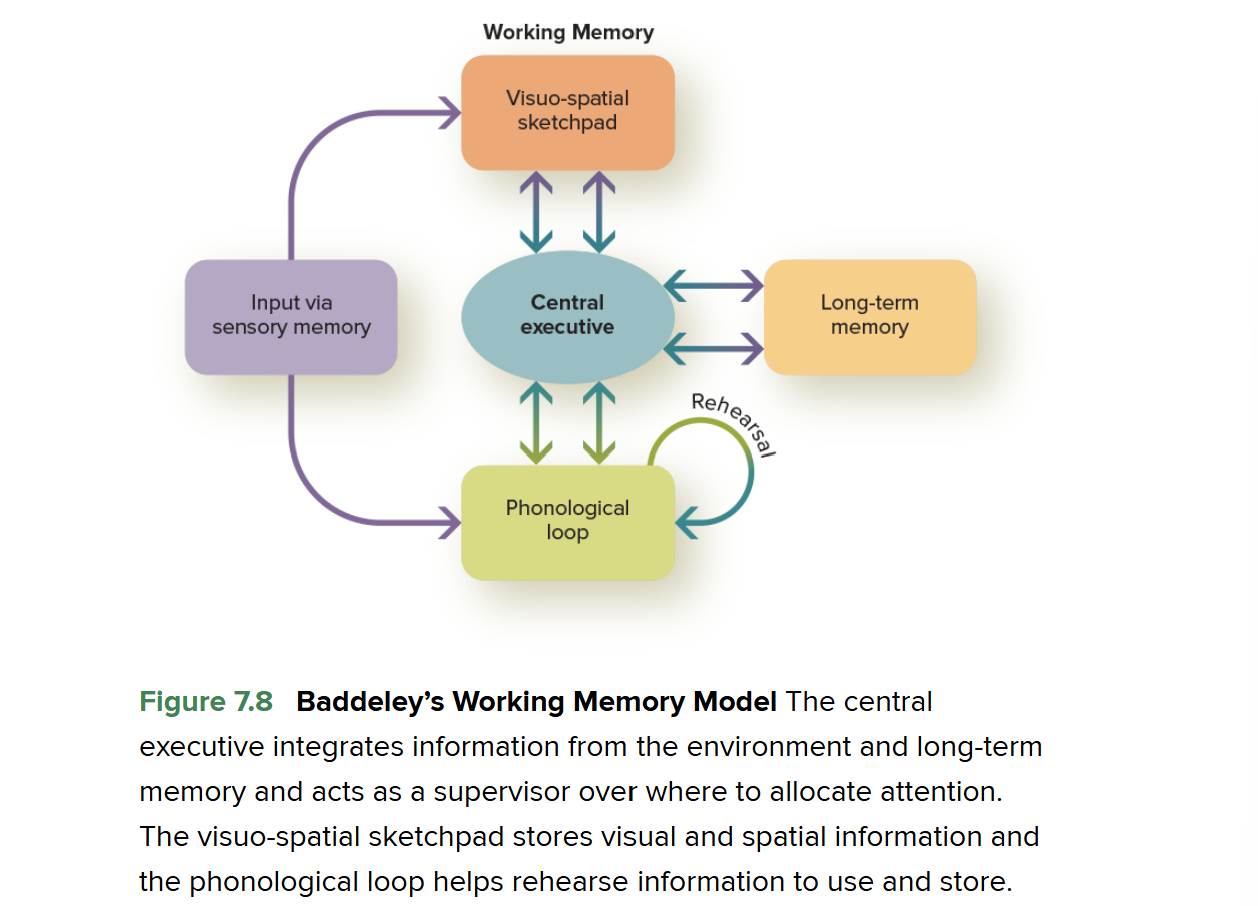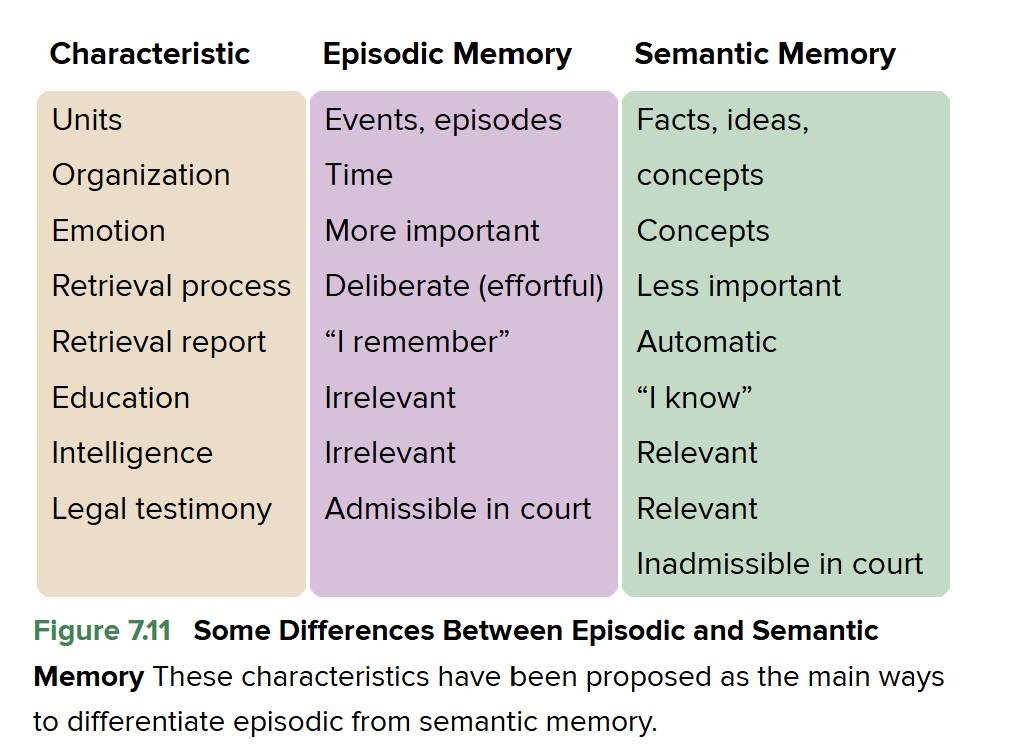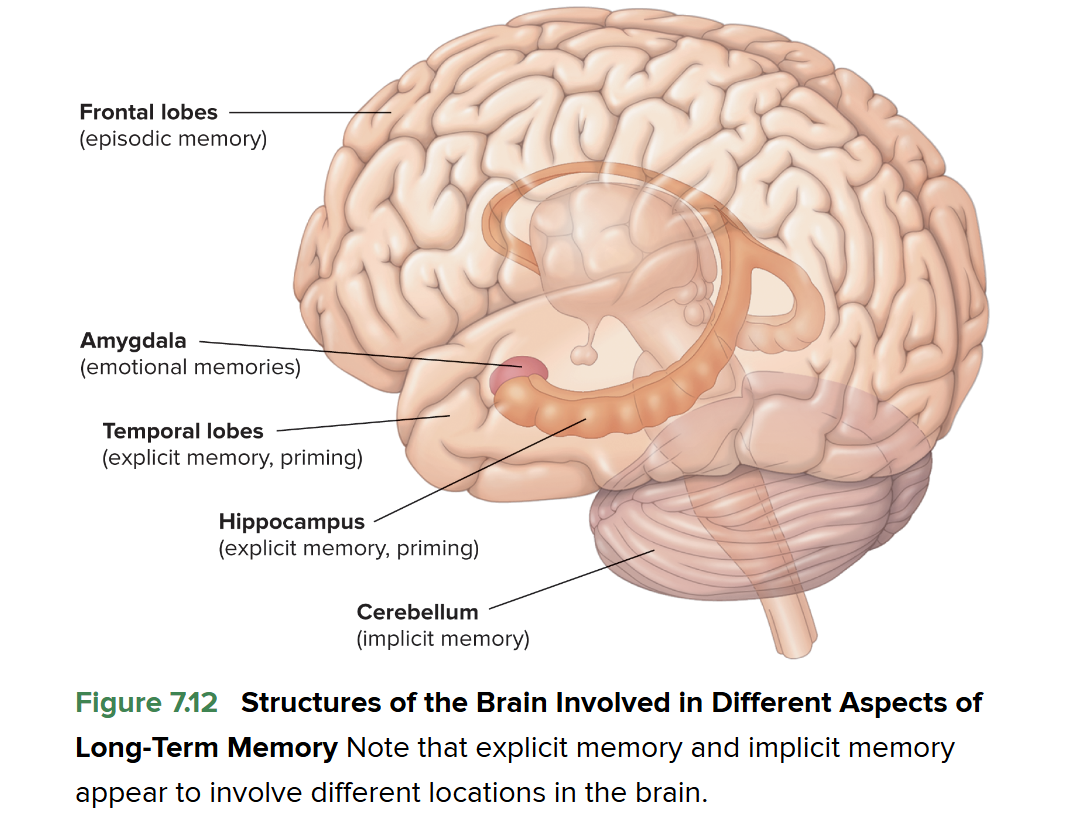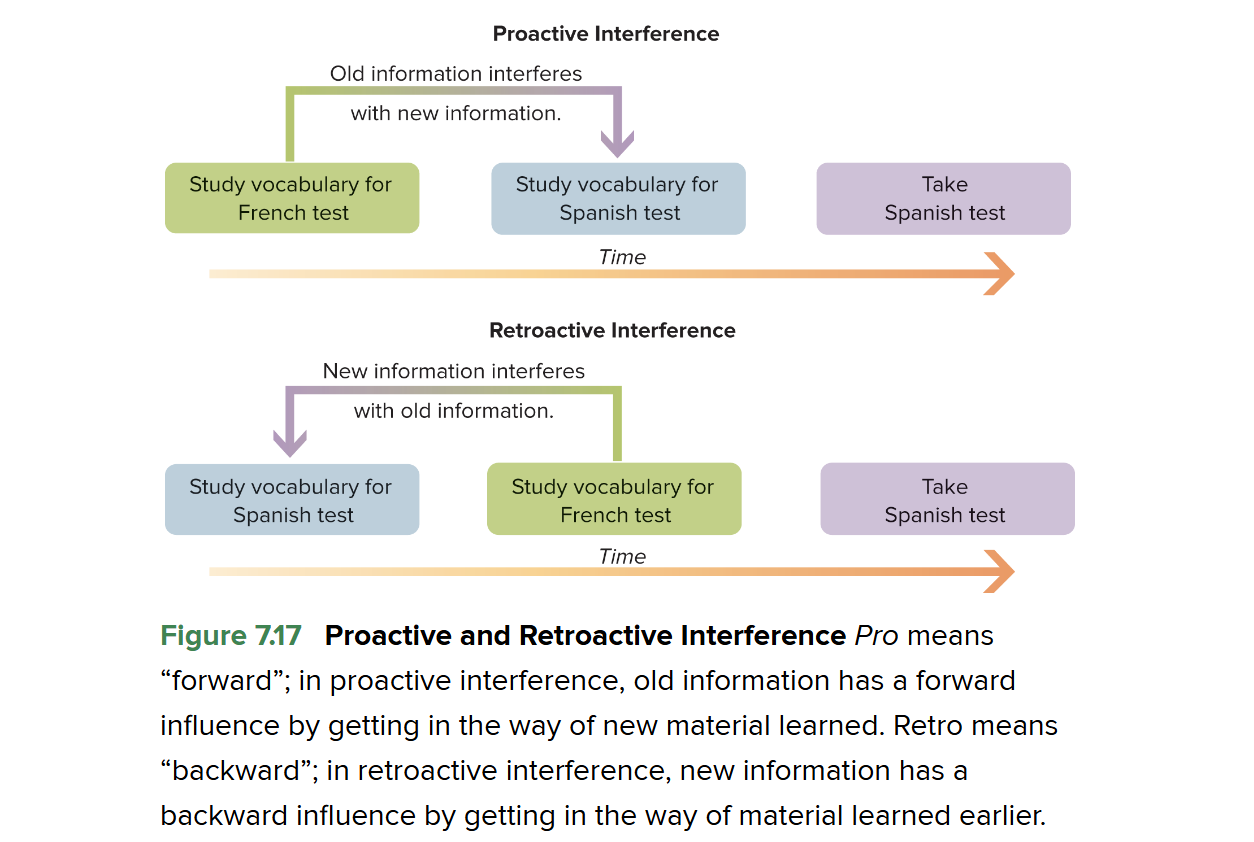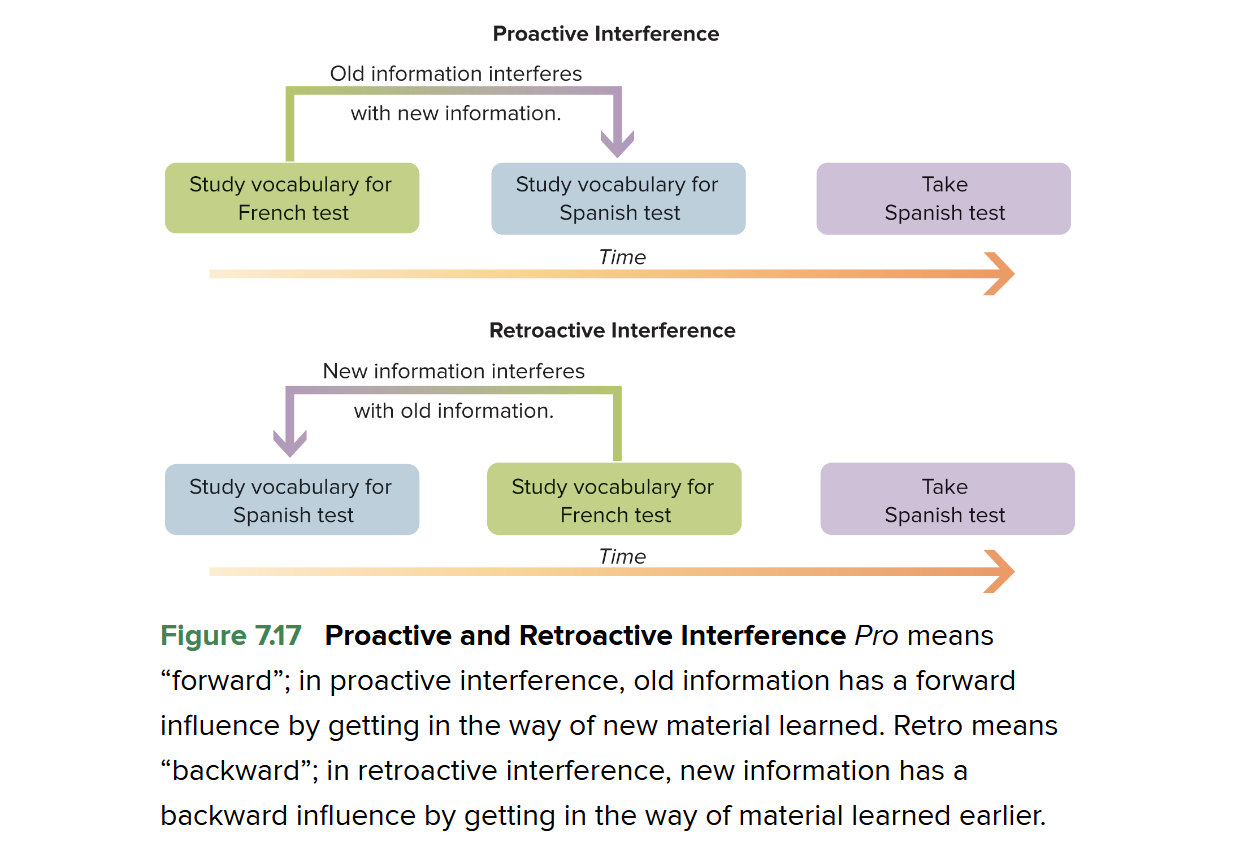Ch.7 Memory
7.1 What is the nature of Memory?
Memory can be defined as the mental capacity to encode, store, and retrieve information, which allows individuals to retain past experiences and knowledge.
3 Important processes:
Encoding
We have to take in the information (ex. the sights and sounds of that night)
Storage
Retain it in some mental storehouse
Revival
Retrieve it for a later purpose (ex. how did you two end up together)
Every aspect of our lives depends on remembering who we are, how to act, what is important to us, and all the relevant information about our world.
7.2 What Is Memory Encoding?
Memory Step 1: Encoding - information gets into the memory storage. Some information gets taken in automatically while other information takes more effort
Encoding that requires effort:
Attention
Deep processing
Elaborating
Mental Imagery
What is Attention?
Selective attention - focusing on a specific aspect of an experience while ignoring the rest. → this is because the brain’s resources are limited
The processing capacity of the conscious mind is estimated: 120 bits per second. It takes half of our conscious capacity to properly pay attention to someone talking to us
Divided attention: concentrating on more than one activity at the same time (multi-tasking like listening to music while reading)
Negative consequences for learning and memory
Sustained attention: ability to maintain attention to a selected stimulus for a prolonged period of time
Those using pen and paper have a better likelihood of containing the information compared to tablet or laptop.
What Are the Levels of Processing?
Shallow processing: noting the physical features of a stimulus (ex. the shapes of letters in the word “mom”)
Intermediate Processing: labelling the stimulus (ex. reading the word “mom”)
Deep Processing: thinking about the meaning of a stimulus (ex. the word “mom” could make you think of your own mother and what makes her special)
Taking something we already know and can easily get from our memory and attaching new information to it
Deeper processing → better recall
What Is Elaboration?
the formation of a number of different connections around a stimulus at an given level of memory encoding
ex. a person can elaborate the word “mom” on the different levels of processing
Shallow: the m’s in the word mom look like two n’s
Deep: thinking about various moms they know, images of moms in art, portrayals of moms in media.
More elaborate → better the memory
Self-referencing: thinking about your own experiences
The more paths we make, the more likely we will remember the information
Greater elaboration of information is linked with neural activity, especially in the left frontal lobe
How Does Imagery Improve Memory?
To create pictures that are associated with each thing that needs to be remembered
Dual code hypothesis: memory for pictures is better than memory for words because pictures are stored as both image codes and verbal codes → two potential paths in which we can retrieve information
7.3 What Is Memory Storage?
Storage - how information is kept over time and represented in memory
Sensory memory - time frames of a fraction of a second → several seconds
Short-term memory - time frames up to 30 seconds
Long-term memory - time frames up to a lifetime
What Is Sensory Memory?
holds information from the world for a brief moment from the time exposed to it
Echoic memory - auditory sensory memory which is retained up to several seconds
Ionic memory - refers to visual sensory memory → only retained for ¼ of a second
Sperling Sensory Memory Experiment
Flashed the letters on a screen for brief intervals and the participants could only report four or five letters. Some said they could see all nine letters but had trouble naming all of the letters
Explanation: all 9 letters were processed at the ionic memory level → why they were all seen but the time they saw it was so brief that they did not have enough time to transfer all letters to the short-term memory where it could be named
What Is Short-term Memory?
A limited-capacity memory system in which information is usually retained for only as long as 30 seconds unless strategies are used to retain it longer
Limited in capacity but can store information for a longer time
George Miller:
on multiple tasks: individuals are limited on how much information they can retain without the help of external aids. Limit of 7 ± 2 items. (phone numbers, student ID numbers, etc all fit in the range)
Memory span - number of digits an individual can report back in order, after a single exposure to them.
What Is Chunking and Rehearsal?
2 ways to improve short-term memory
Chunking: grouping information into higher units that can be remembered a single unit
Makes large amounts of information more manageable
Rehearsal: the conscious repetition of information
Information lasts 30s > without rehearsal in S-TM
Works best to briefly remember a list of numbers or items
Not good for long-term → we remember information in the long-term better if we add a meaning to it
What Is Working Memory?
- A combination of components, including STM and attention, that allows us to hold information for a while as we do cognitive tasks
Important for problem solving and cognitive tasks
STM → passive. WM → active
You can retain a list of words by rehearsing them but you can’t solve a problem while rehearsing information and vice versa
Chunks to remember in working memory are more complex → capacity 4 ± 1 / 3-5 chunks
In working memory, the brain works with and puts information together to help us understand and make decisions. The mental place where thinking occurs
Comparsion: The capacity of working memory is like the RAM on your computer
Working memory is like the files you have open on your computer
Lion man staute made a bunch of years ago: working memory would work like “ what would a lion and a man look like if i combined them together?”’
How does it work?:
Phonological Loop: briefly stores speech-based information about the sounds of language.
Acoustic code: sounds we heard (lasts a few seconds)
Rehersal: allows us to repeat the words
Visuo-spatial sketchpad: stores visual and sptial information.
Limited capacity
Central excecituve: Combines information from both components + the long term memory.
Limited capacity
Selects what information needs attention
Strategies to process information
Comparison: YOU opening and closing files on your computer
Central executive: the boss
Phonological Loop + Visuospatial sketchpad: coworkers who work for the boss
There is no single place/strucutre in the brain that represents the workers in working memory. The areas of the brain associated with information that’s needed in cognition are temporarily activated when the information is recalled
ex. rehearsing words: verbal areas of the left hemisphere (Wernickles area) are active. Occiptotemporal regions are active when imagining pictures. Preforntal cortex too
What Is Long-Term Memory?
permanent type of memory that stores a lot of information for a long time
Storage capacity is unlimited in a way.
Components of Long-term Memory
Explicit Memory (Declarative Memory): who, what, where, when, why
The conscious recollection of information: specific facts, events that can be verbally communicated
Forgetting occurs in the first three years after taking the classes and then levelling off.
Permastore memory: part of original learning that happens to stay with the person forever
Episodic memory: retention of information about the where, when and what. How we remember life’s stories
ex. where you were when your younger sibling was born, what you ate for breakfast this morning
Activity in the hippocampus is associated with past experiences
Semantic memory: knowledge about the world. Areas of expertise, general knowledge, learning in school, everyday knowledge
ex. a person’s knowledge of chess, or geometry, who a famous singer is
Independent of a person’s identity with the past. You can know something but have no idea where you learned it from
Amnesia (memory loss): can forget who they are, their family, name, career, but can still talk and have general knowledge of the world → Episodic memory is impaired (maybe the hippocampus) but semantic memory remains
memories in the explicit memory are not one or the other but rather a mix of both
Implicit Memory (Nondeclarative memory): how
behaviour is affected by prior experience without a conscious recollection of that experience.
Procedural memory (skills): memory for skills
ex. not needing to look at the keyboard to be able to type
driving eventually becomes part of your procedural memory
Priming: activation of known information to help remember new information better
occurs when something evokes a response in memory
Classical Conditioning: association between two stimuli
How Is Memory Organized?
stored carefully
ex. recalling the names of the month: usually said in chronological order but cant be recllaed the same if asked to name in alphabetical order
Schema: a pre-existing framework that helps people organize and interpret information for new experiences
ex. when you go to a new restaurant even though you’ve never been there before you know the protocol of what will happen (you order, waiter takes food,etc).
When we store information in memory, it fits into the collection of known information
Script: a schema for an event
What Are Connectionist Networks?
Connectionism: memory is stored throughout the brain in connections among neurons, several of which may work together to process a single memory.
Memories are not large knowledge structures but electrical impulses, organized to the extent of the neurons, their connections among them, and their activity organized
Any piece of knowledge is linked to several hundreds to thousands of neurons and not a single location
How does it work: neural activity involving memory is spread across multiple areas of the cerebral cortex. Nodes (location of neural activity) are interconnected and when it reach a specific point of activation, it can affect another node across synapses.
Strength of synaptic connections are the fundamental bases of memory
Explains how priming a concept (achievement) can influence behaviour (performance)
Where Are Memories Stored?
rather than memories being storied in a single place in the brain, they are PROCESSED, represented as connections throughout the brain, states of brain activity, recreating the brains function from when the experience first occurred
How Do Neurons Relate to Memory?
One memory can involve as many as 1000 neurons.
Single neuron may fire as a response to faces, eyes or hair colour, but you would need these neurons to act together to recognize an individual
Serotontin involved.
What Brain Structure Affect Memory Functions?
depends on what is being remembered
Frontal Lobes: episodic memory
Amygdala: emotional memories
Temporal Lobe: explicit memory, priming
Hippocampus: explicit memory, priming
Cerebellum: implicit memory
7.4 What Is Memory Retrieval?
Takes place when information that was retained in a memory comes out of storage
What is the Serial Position Effect?
The tendency to recall the items at the beginning and end of a list than in the middle.
Primary effect: better recall of items at the beginning of a list
Why?: they are rehearsed more or the receive more elaborate professing than the words later in the list
Recency effect: better recall of items at the end of a list
Why?: When the words are recalled, they might still be in working memory. Even if they’re not, they were encountered the soonest which makes it easier to recall them more
Both can influence how we feel about stimuli (ex. the best for last)
What Are Retriveal Cues and the Retrieval Task?
nature of cues can trigger your memory and the task of retrieving the memory that you set for yourself
You need to create effective cues to remember something
Cues can trigger and help the revival of a memory but the task of getting the memory you have to set yourself
You may think you know the face of the person of a crime but when asked to point out the person you may have a hard time deciding who it was
Whats the Difference Between Recall and Recognition?
Recall: a memory task which you have to retrieve previously stored information
You need to recall all the events of, for example, WW1 in an essay
Recognition: a memory task in which an individual has to identify learned items (ex. mc test)
You judge whether a stimulus is familiar. You have the answer you just need to recognize it
What Is Encoding Specificity?
Information present at the time of encoding/learning tends to be effective as a retrieval cue
ex. you may recognize your prof inside the class but not outside the class in different attire
How does Context Affect Encoding and Retrieval
a change in context between encoding and retrieval can cause memory to fail
Content-dependent memory: when recalling information in the same context they learned it in, they have a better attempt to recall the information.
Why? They have encoded features of the context in which they learned along with the actual information which can act as retrieval cues later
What Are Special Cases of Retrieval?
When we retrieve a memory, some parts of that memory may have gaps or missing parts that we somehow need to fill
Factors that affect memory:
Patterns of information we remember
schemas and scripts
the situations that are associated with memories
personal/emotional context
False Memories: remembering an event that didn’t happen
Involve an error in distinguishing between two kinds of mental content: Internally generated experience (you thinking you told your friend something) and externally generated experience (actually telling them something)
We can usually tell the difference because if it actually happened the memory is more vivid
Study: participants are given a listen of related words and asked later if another related word that wasn’t on the list was there. They would say it was and this is because it’s so related to the other words that it creates a strong internal activation
Autobiographical memory: a special form of episodic memory: a persons recollections of their life experiences
Reminiscence bump - the effect that adults remember more events from the second and third decades of their life than other decades. Could occur because we are forming a sense of identity during our teeens and twenties or because most important events happen during this time
3 Levels of Autobiographical Memories:
Life time periods - Long segments of time measured in years and even decades
ex. something about your life in high school
General events - extended composite episodes measured in days, weeks, or months
ex. a trip you took with your friends in high school
Event-specific knowledge - individual episodes measured in seconds, minutes, or hours
the feeling of going on a boat during your trip
What is Different About the Retrieval of Emotional Memories?
emotion affects the encoding and storage of memories
More emotionally intense → paying more attention to it → remembering it better
Memory goes where attention flows
Flashbulb memory - the memory of emotionally significant events that people often recall with more accuracy and vivid images than everyday events
ex. The 9/11 attack
- Several decades later, people will often remember where they were and what was going on in their lives at the time of the event. Not as precise as people think they are
They’re still more durable and accurate than day-to-day memories
Why?: they’re usually rehearsed in the days following the event + the emotions triggered by the events
How is Memory Affected by Traumatic Events?
Memory for traumatic events are usually more accurate then memory for other events
Why?: the release of stress hormones during the event could affect the durability and vividness of the event
They can still contain errors and they may occur in the details of the traumatic event
What Are Repressed Memories?
motivated forgetting: when an individual forgets something because it is so painful that remembering it is intolerable
May be a consequence of emotional trauma
Discovered memories: regardless of their accuracy, individuals do experience them as real
Study
Children over 4 are very unlikely to report false reports
What Is the Truth About Eyewitness Testimony?
much interest is focused on distortion, bias and inaccuracy in memory:
Distortion: memory fades with time or can be changed with new info
Bias:
To prevent this: lineup whether witness views a group of individuals in real time or photos of who they think is the suspect
Double-blind procedures: no one involved in the lineup knows the suspect of the case
7.5 Why Do We Forget?
Factors that influence how well we can retrieve information from long-term memory
What is Encoding Failure?
Occurs when the information was never entered into long-term memory
not a case of forgetting but a case of not remembering
What Is Retrieval Failure?
ex. paid attention to the lecture, studying the material, you know it, but you cant recall it on the exam.
Why?: problems with the information in storage, the effects of time, personal reasons for remembering/forgetting and the brain’s condition
Trying to retrieve information consistently = better learning even if the recalling isn’t accurate
What is Interference?
Interference theory: people forget not because the memories are lost in the storage ut because other information is in the way of what they want to memory.
Proactive: when material that was learned before disrupts the recall of material learned later
ex. typing in your old password instead of your new one
Retroactive: when material learned later disrupts the retrieval of the information learned earlier
ex.
Problems with retrieval cues can be an explanation for interference
ex. one thing can make you think about two things
What is Decay?
Decay theory: when new learn something new, a chemical memory trace forms but over time this trace disintegrates
Memories often fade over time but it alone cant explain forgetting
We can recover memories we’ve forgtotten under certain retrieval conditions
What Is the Top-of-the- Tongue Phenomenon?
A type of effortful retrieval that occurs when we are confident that we know something but cannot quite pull it out of memory
occurs when we can recall some of the needed information but not all of it
demonstrates that we do not store all fo the information about something in one way
What is Prospective Memory
Retrospective memory; remembering information from the past
Prospective memory: remembering information about doing something in the future
timing: when we have to do something
content: what we have to do
Time-based prospective memory: our intention to engage in a specific behaviour after some time has gone bu
ex. the intention to call someone an hour later
Event-based prospective memory: we engage in the intended behaviour when some external event/cue triggers it. More efficient than time-based bc of the cues
Absentmindedness: the failures in prospective memory
occurs when we are preoccupied with something else
What Is Amnesia?
the loss of memory
anterograde amnesia: a memory disorder that affects the retention of new information and events (antero = forward in time
retrograde amnesia: the memory loss for a sement of past events
7.7 How Does Memory Contribute to Health and Wellness
Autobiographical memory: we store the lessons we have learned in life
allows us to learn from our experience
to understand ourselves and provide a source of identity
Jefferson Singer et al: internalized stories of personal experience serve as signs of the meaning we have created out of our life events and makes our lives make sense
Dan McAdams: autobiographical memories form the core of our personal identity
indidivudals who describe important life experiences that go from bad → good (redemptive stories) are the kind of people who make a contribution to future generations
Contamination stories: good → bad
Reconstruction and construction reveals important information of how individuals grow, function and think.
How Do We Keep Memory Sharp and Preserve Brain Function
engaging in intellectually challenging activities seems to offer some protection against the mental decline associated with aging
Active cognitive life → diagnoses for brain disease later on → brains have compensated flexibility for the issues brought on by the disease
Cognitive Store: an emergency stash of mental capcity that allows indidivudlas to avoid negative effects of harm to the brain (compensation)
Lecture Notes
confabulation - we fill in the blanks in our memory
Memory is filled with our imagination, beliefs, etc.
hierarchy of evaluative importance for everything we experience
part is made through genetics: what we need to pay attention to and what we don’t
part: our own experience
memories may be visual auditory or tactile
recognition memory for smells but not the same as recall
the scent is important in conditioned memories
conscious and automatic: memory process system
encoding
attention
limited naturally
most of what we pay attention to is decided before we were born
consciousness
spotlight analogy: we’re paying attention to the environment 23/7 → low level of attention. If you want to remember something you “put your spotlight on → higher-level attention.
Emotion affects intension → greater emotional intensity → more attention → more memorable memory
traumatic: Greater the trauma the more you can remember but until a point
preprogrammed behavioural patterns to what we pay attention to + our experiences: what we pay attention to
Shallow processing: constantly: structural encoding
capital letters, what colour, etc)
Intermediate: what we use as children: phonemic encoding → learning by sound
(rhyming, homonyms)
Deep: can be learned?: semantic encoding
(meaning, symbolism)
Facilliating Encoding
elaboration (using examples)
visual imagery
if you’re like going through a rough treatment and are fighting for your life, if you believe the treatment is really doing something it’ll increase your immune system function
self-referential encoding (applying information to your life)
rehearsal and over-learning (
deep and transfer appropriate processing (closer the encoding and retrival environment are, it’ll facilitate your memory)
environment is a strong facilitator of memories
mc: study for recognition memory
short answer: Recall
disturbed practice
Distribute practice over time → increase the attention
most people after 50 minutes, their attention drops off significantly
organize information
implementation intentions
Mnemonics Devices
Verbal mnemonics
acrostics, acronyms, rhymes
Visual mnemonics
link method, method of loci, keyword
SQ3R
chunking: utm: not remembering them as 3 letters but as one thing.
Encoding specificity
Idea that ease of retrieval of a memory depends on match of encoding with retrieval
- poor recall if shallow learning is examined using a deep processing technique
You wont do well
State dependent memory
if you’re sad its difficult to notice happy things and remember happy things and vice versa
Storage
3 storage facility (anologies)
sensory register - visual and auadioty
short term memory
long term memory
behavioural genetics
STM
after 20-30s without rehearsal →iinformatin fades
limited capacity (7 items)
working memory: everything about short term memory + all of this
4 + 1 → chunks of information
solves problems
respond to environmental demands
achieve goals
visual memory store
temporary image
info about location and nature of objects
20-30s
verbal memory store
limited capacity
shallow (processed in order of presentation and are subject to interference)
central executive - responsible (most important part of your brain) to control what you pay attention to.
double dissociation - you can have damage to verbal memory but not visual and vice versa
LTM
theoretically limitless in capacity
The primacy effect
you’ll remember the first word of a list
The recency effect
remembering the later words
The Serial Position Curve
Working Memory and LTM
— evidence supporting a distinction between working memory and LTM
working memory is easily accessed ut is limited in capacity
Neurlogical studies in which brai damage impairs memory
ltm impairment person shows normal working memory but cannot transfer information to LTM
working memory deficit: a person has a memory span of 2 digits but normal LTM
Functional Aspects of Memory
— males remembered more about
—- females remembered more ab
what you’re interested in is what you’ll pay attention to more
Networks of Association
LTM is organized in clusters of information that are related in meaning
the network is composed of interconnected nodes
a node mat contains thoughts, images, smells, emotions, or any other information (it is a schema plus)
mnemonic devices allow one to add concepts to existing networks
Declarative memory
semantic: general knowledge of facts
episodic: autobiographical, what you’ve done. (episodic memory of having the lecture)
explicit (conscious awareness)
Repressed Memories
retrieval failures: you’ve encoded the information but can’t retrieve it when you want it (not a retrieval failure if you didn’t encode it in the first place)
motivated forgetting: missing your dentist appointment when you’re working bc you’re scared of the dentist. the unconscious is acting on its own interest
Denial: not believing that the thing is true or real / knowing its real but that it wont apply to you (ex.smoking)
Repression
Psychogenic amnesia: a type of psychological trauma that causes you to forget
Sometimes the information comes back sometimes it doesn’t
may be related to dissociation
False Memory Syndrome
confabulation
Figures
